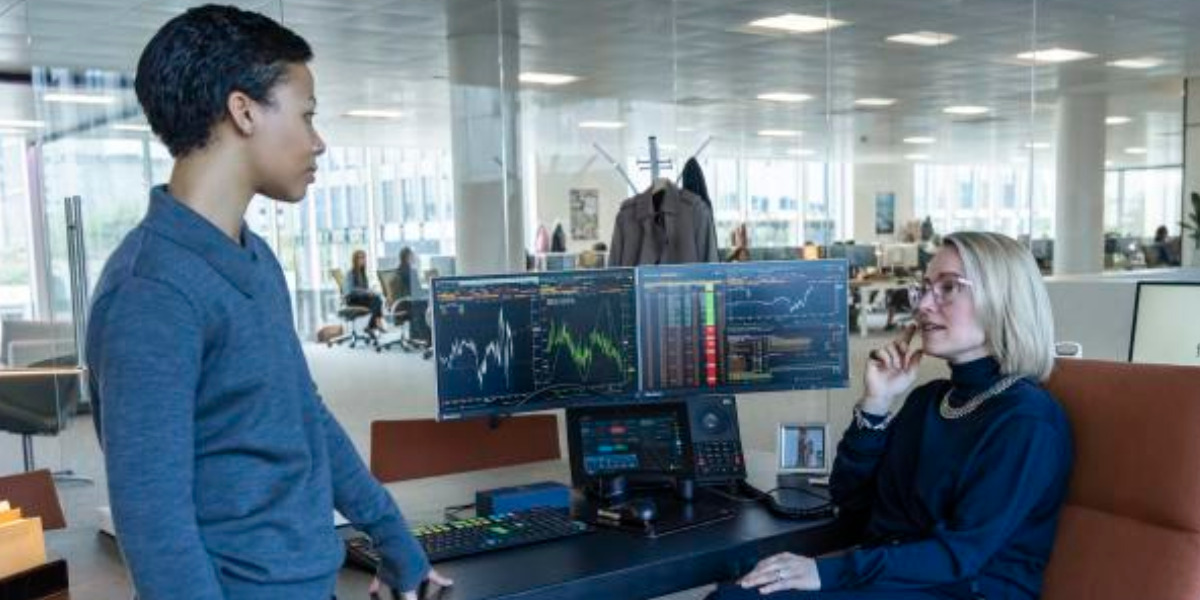HBO Max’s ‘Industry’ is a show that presents the worldviews of young bankers and traders in an adrenaline-fuelled, all-or-nothing light. The first season utilizes the RIF to showcase the cutthroat reality of financiers, and the second season employs healthcare companies to mirror the market in its post-pandemic ambiguity. Consequently, the third season follows in the same footsteps and brings a different side of the finance world to the screen. This time, the narrative finds the central protagonists in surprisingly different stages of their careers—especially Harper Stern, who was previously fired from Pierpoint for forging her qualifications.
Still, through her current job as an assistant at FutureDawn, Harper’s storyline remains aligned with the overarching focus on sustainability and ethical investing that Pierpoint is currently championing through investment in Lumi, a green energy company. Therefore, as the narrative focus relevantly shifts toward a new side of trading, one is bound to grow intrigued by the companies that highlight the same.
Lumi and FutureDawn: The Fictionality of Industry’s Green Companies
Lumi and FutureDawn occupy a similar sphere within the narrative of ‘Industry.’ Even though the latter has been around on the sidelines from earlier seasons, usually entangled with Yasmin’s clientele, it becomes a prominent element in the third season. With the ever-shifting culture, Pierpoint steers itself toward ethical and ESG investing, further blurring the hierarchy between ethics and profits. Thus, FutureDawn carves a more prevalent space within the storyline, and Lumi, a new company, finds its introduction. Nevertheless, much like most other market-specific elements of ‘Industry,’ Lumi and FutureDawn also retain a fictitious spot within the show.

For the most part, both companies’ core purpose within the show stems from the narrative’s shift toward green and sustainable investment opportunities. FutureDawn is an investment fund helmed by a socially conscious Anna Gearings, who is all for ethical investing. Nevertheless, despite the motion sensor lights installed in her offices, she undermines her own sustainability by regularly demanding print-paper copies of her diary. Likewise, Lumi, a new company specializing in green energy, is helmed by an absurdly rich heir, Henry Muck, whose green diet is undercut by his nonchalance toward waste. Thus, whether intentionally or not, the show utilizes both companies to make a statement about the nuance of modern environmentalism.
Industry’s Foray into Ethical Investing
More than the companies themselves, Lumi and FutureDawn’s connection to reality stems from the part they play in the third season’s exploration of ethical investing. Ethical Investing is a strategy where investors factor in their own ethical values while making investments. ESG Investing—the route Pierpoint takes this season is a type of the same strategy with Environmental, Social, and Governance as the three primary pillars that are considered in any share before investment. Although this strategy has been around for a long time, the 2020s have seen a more mainstream spike in investor’s interest in it.

For its part, ‘Industry’ offers various different insights—to varying degrees—into the sentiments behind Ethical Investing. There are individuals like Anna who, despite her shortcomings, genuinely believe in the idea of Ethical Investing. Meanwhile, even though the folks at Pierpoint remain invested in the concept—with Eric, Yasmin, and Robert spearheading the same through Lumi—their involvement speaks more towards their inclination to succeed than their actual ethics. Lastly, there’s Harper, who considers the whole thing to be a fad that is bound to go out of style and, subsequently, profit eventually.
Therefore, Lumi and FutureDesk become the show’s most vital catalysts in introducing the prevalent theme of Ethical Investing into the narrative. Both companies allow the storyline to play around the concept in drastically different ways, covering multiple bases. Thus, even though they don’t hold a counterpart in reality, they remain instrumental conduits in bringing a part of the trade world’s reality into the show.
Read More: Best Movies About Money and Business on Prime Video


You must be logged in to post a comment.